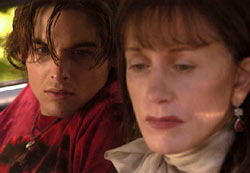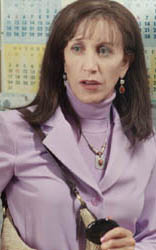Ellen and Jim Have a Blog, Too
We are two part-time academics. Ellen teaches in the English department and Jim in the IT program at George Mason University.


_Transamerica_: a benign masquerade of caricatures & grotesques · 24 February 06
Dear Miriam1,
Thank you for allowing me to write to you. I doubt Fanny would be in sympathy with what I’m going to say—seeing as how she and Alexandre seemed to have refused up to the end of their son’s life to recognize the possibility he was not fitting in, was miserable and could not succeed in the marital and military networking they wanted because he was not the prodigy they imagined and was probably also gay.
I saw this movie two weeks ago now, and want to tell you about it before I forget its details. It’s more than a movie about a transsexual (man become woman). Its story makes visible how individuals are suffering as family comittments dissolve away in the wake of a lack of reinforcement from rituals like legal marriage.
The film was NOT sympathetic to transsexuals as Broke Back Mountain was actually unsympathetic to gay men (it made me want to read Proulx’s story which I’m told is sympathetic and also rooted in a love of the bareness of the natural world). The subtexts of both film-stories (images, choice of actors, dialogue) plus the stories themselves (of misery brought on by not being traditional) were hostile to the supposed overt progressive message. Both films are overtly kind to a caricatured presentation of working-class Americans, white and black. A exaggerated version or presentation of their pop culture is everywhere as the glue of what keeps people together: baseball caps, junk food, alcohol, easy sex.
In Transamerica Felicity Huffman plays a man undergoing a series of minor and major surgery to make her physical appearance that of a woman. The reality all the characters insist upon and which Huffman comes to make central to her/his life is Bree (the female name Huffman takes) is Stan (the male name she had before her operations) and the father of Toby (played by Kevin Zegers), her/his biological son by a woman he/she was married to, deserted and who long before the movie began committed suicide. The man Stan’s abandoned wife left Toby with beat and abused Toby sexually, and when we first meet Toby he is in prison for drug abuse, and is self-destructing all alone. Stan-as-Bree’s psychiatrist will not allow Stan-as-Bree to have the final operation, one which removes his penis (there is an inordinate amount of attention paid to Stan-as-Bree’s penis in the film) until Stan-as-Bree visits Toby and lives up to his responsiblity towards the boy somehow or other as his father.
Stan-as-Bree therefore leaves California where he works as a dishwasher in a restaurant, goes to NYC and collects the boy, and, upon seeing what danger Toby is in, attempts to help rehabilitate Toby by bringing Toby back to his apartment in LA. As we travel across the US, we see other situations where the traditional family not having moorings in adequate jobs, stability, and the other things that reinforce a relationship leave people astray and without comfort.
Ironically though, when we meet Stan-as-Bree’s family we are greeted by a hard caricature of a bullying silly married wife-mother with Stan-as-Bree’s henpecked husband-father. After a lifetime of unaccountably making more than enough money (for they seem too dumb to know when to cross a street), they are now attempting wrongly to control a daughter who (like Toby) is in danger of becoming a drug addict.
All’s well that ends well: at the last moment we realize Stan-as-Bree and Toby did bond, for, after a rupture where Toby attempted to go to bed with Stan-as-Bree, and had to be told Stan-as-Bree was his father, and fled in horror, hurt, and anger, Toby gets a job in LA, and then turns up in Stan-as-Bree’s apartment where Stan-as-Bree is only too relieved to take him in. Stan-as-Bree has his/her final operation. It ends as a benign fairy tale.
I’ve come across comments that the movie builds sympathy for transsexuals by showing how frightened Stan-as-Bree is lest anyone know, how much an outcast. Someone on Wompo declared in its favor "this ‘passing’ individual does live in fear, internalized dread, panic, horror, & desperation," and therefore do go see it! Stan-as-Bree is rejected by her parents at first, and is utterly subject to psychiatrists who can declare whether she gets an operation or not.
It’s also possible to think that the film shows us just how much femininity is a construct as we watch Stan-as-Bree put on her make-up, take her hormones, totter along on her super high-heeled shoes, & learn to walk as a woman (with occasional calculated lapses into a masculine stance).
Nonetheless, I suggest one way the film is intended to be taken is more as a satire on women as cartoon figures, vain, and overdone and middle-class married aging (dumb) semi-elites (Stan-as-Bree’s parents). I suppose we are to celebrate that transsexuals, transvestites and gay people are not being presented as sheer monsters, but they are revealed as freaks in the masquerade party with nothing on their minds but sex and penises, as people who do nothing but play drag-queen and say salacious remarks. Had the film really been sympathetic to transsexuals, it would not have had a straight actress playing this part. During Stan-as-Bree’s and Toby’s trip across the country, they stop off at someone’s house where we see a bunch of transsexuals and transvestites at a party and they are presented as hideous sex-obsesssed grotesques. Stan-as-Bree is intensely embarrassed and apologetic and seeks to protect Toby from these men-as-women. It’s a leering masquerade. All are women who are trying to be men or have undergone a sex change operation.
Taken together with the depiction of the irremediably stupid controlling narrow mother, this is a film with much anti-feminism. This vein is contradictory or ambivalent as the one thing that holds people together is biological bonds, and the mother is the one who takes Stan-as-Bree in. When she discovers the "bum," Toby (accompanying Stan-Bree), is Stan-Bree’s son and her grandson, she is suddenly entranced, and wants to keep and to support Toby. Except for one black woman who cared for Toby when he was young (and thus is not his biological mother), mothers in the film are erased or silly and densely cruel. The father is without agency in the film. Both seek to buy Stan-as-Bree and Toby with their middle-class wealth and comfort in exchange for freedom and common sense. Stan-as-Bree leaves quickly, and Toby follows after.
I would argue it’s not the only woman-centered film where an actress was nominated for the Academy Award. It’s center is a missing or cut-off penis. Felicity Huffman has arms, legs, chest and face as unnaturally thin as Rachel Weisz, Keira Knightley, and Charlize Theron. Stan-as-Bree differs only in that she’s faking it.
Rare pleasant companionable moments occur in the movie when Stan-as-Bree meets up with a Native American farmer, part Mexican, part Indian. He likes her and treats Stan-as-Bree with respect and courtesy and love (unlike all the men who encounter with Toby and treat him as a seductively-attractive and effeminate male prostitute). Stan-as-Bree doesn’t tell the farmer she’s not quite a woman, & we are to feel she is "lying" (Toby’s word).
Growing unacknowledged but real enough need, affection & mutual help is also dramatized in the increasing attachment and mutual respect of Toby and Bree-Stan as they drive "transamerica" in a rented beaten old car (stolen from them the minute they try to do a good deed for someone else).
Huffman and Zegers do both deliver fine acting performances throughout. Huffman really conveys a man dressed up as a woman. Hers is a calculated performance. She thought about it. She will lapse suddenly into a male way of sitting (showing perhaps that masculinity is also a construct). More queasy are the scenes where she has to urinate in the open on the road. We see her struggling because she is trying to hide her penis. It’s getting in the way. Only in the final scene does she drop this body awkwardness and posture herself and gesture like a calm mother handing her son something to drink (a coke).
Yes, Felicity Huffman is presented as having a deep feeling heart, much intelligence and integrity but we are to feel that somehow she had "gone wrong" somewhere and it’s those terrible parents’ fault (probably especially the mother). Kevin Zegers has a similarly paradoxically good moment as he sells his body to make money for Stan-as-Bree after their car and money are stolen. And we are to feel at the fairy tale close that Stan-as-Bree because she has been a man will be a loving companion to Toby at long last—and because they are bonded as father-mother and son.
Biology cannot be fooled?
Chava
1 Miriam is Julie’s other pseudonym. Her great-grandmother’s name too.
--
Posted by: Ellen
* * *
Comment
- Dear Chava,
I haven’t seen Transamerica, myself. How terribly ambivalent it all sounds: not only Huffman’s character’s gender duality – as the father-aspect and male element in bonding do seem to be stressed as well; but all the attitudes surrounding family and identity, and the veneer of sympathy merging with alientation and lack of understanding. It’s odd and disturbing in itself that a film negative towards women is also one in which the central character is committed to becoming one in such ultimately radical ways.
Perhaps I am wrong, but I do understand the sense that real suffering, rather than mere difference, may be a compelling force behind such extraordinary effort to divest oneself of an original physical identity and construct another. Change being a means of escape from the intolerable, as well as to the desirable. In which case, the film’s ‘inescapable’ biological bond may be ironic as well as reassuring…
You said:
"It’s more than a movie about a transsexual (man become woman). Its story makes visible how individuals are suffering as family comittments dissolve away in the wake of a lack of reinforcement from rituals like legal marriage.
As we travel across the US, we see other situations where the traditional family not having moorings in adequate jobs, stability, and the other things that reinforce a relationship leave people astray and without comfort."
This is an area of real concern to me. As Miriam and as Julie: family bonds, created communities, stability: anything that gives people context, safety nets, much-needed comfort. Their disintegration grieves me. We need the ties that anchor and support us. And ritual and commitment – even mere loyalty to family – are great strengtheners of bonds that may otherwise, in extremities, fray.
I wish Fanny and Alexandre had been able to see Alex as he was, no matter what that entailed, and love him freely; without demands either to perform – or conform…
Miriam
— Julie Vollgraff Feb 25, 7:50am # - Is a transvestite different from a transsexual? Someone told me that they are the same, but you said "transsexuals and transvestites" which implies that they are different.
— Jennica Feb 25, 3:49pm # - Dear Miriam and Jennica,
Yes I thought one of the moving aspects of the film was its recording of this dissolution of commitment and what can occur. No one took responsibility for Toby, and he almost self-destructed.
When I first wrote about the film on WWTTA, I got the terms confused myself. Here are the definitions Rebecca N on WWTTA provided:
Transvestite = cross-dresser.
Transgender = self-identifies as the opposite gender, or at least does NOT identify as completely
described by their biological gender.
Transsexual = Transgender person who has or intends to have surgery to change their anatomical sex.
Intersexual = Has a congenital medical condition that makes them not clearly either biological sex,
or both, i.e. Androgen Insensitivity Syndrome.
Chava
— chava Feb 25, 4:34pm # - I asked my mom and friend whether a transvestite was the same as a cross dresser, and they said it wasn’t. So I guess I was right originally when I thought that a transvestite is a cross dresser.
And while we are on the subject of the difference between terms, I might as well ask if my friend was right when she said that bi-curious is the same as questioning. I thought they were different.
— Jennica Feb 25, 6:17pm # - Dear Jennica,
Just stopping to say I don’t understand the question. What do you mean by "bi-curious is the same as questioning"?
Sophie
— chava Feb 25, 7:11pm # - Well now I don’t understand your question. What I’d like to know is what is the definition of bi-curious?
— Jennica Feb 25, 7:20pm # - Ah. I never heard the word before. I just looked it up on the Net by googling and here’s what I found:
1. A curiousity about sexual relations with a member of the same gender.
2. a person who contemplates a sexual interest in both sexes.
PRONUNCIATION:
bi·cu·ri·ous • (noun)
EXAMPLES:
Being bicurious, Mary enjoyed contemplating sex with Nancy.
Sophie
— chava Feb 25, 9:59pm # - A friend on Wompo qualifies my review
as follows:
Very very interesting to see your blog working with film, HOORAY —keep it going, it is so needed. I haven’t seen the Transamerica film, but this is a short quote from a gay-writer’s article on the effect Brokeback Mountain is having on American culture, a result that has been quite positive, according to everything I have read, though there is, of course a long way to go toward a film that would be entirely supportive of gay unions, let alone marriage—
(see link to article upper right—opens in a separate window) at:
http://www.advocate.com/index.asp
The Brokeback Mountain effect
By Adam B. Vary
The Advocate, February 28, 2006
". . . when Eichler walked into a large stadium-style theater showing Brokeback, it was absolutely packed. Eichler saw families, older married women and men, groups of teenage girls, and straight high schoolers on dates. He saw precisely one gay male couple. And he saw that the only seats left were literally in the front row. As Eichler settled in for the trailers, he couldn’t help but wonder if these people had any idea what they were about to see.
"He needn’t have worried. There were no groans, no inappropriate titters, no popcorn thrown at the screen. The audience watched ranch hands Ennis Del Mar (Heath Ledger) and Jack Twist (Jake Gyllenhaal) fall in love while herding sheep in the Wyoming mountains in 1963, and then furtively continue their romance over 20 years while marrying women and building separate families with rapt attention.
Well, save for one moment. When Ennis and Jack engaged in their first sexual encounter in a pup tent on a cold Wyoming night, a teenager sitting directly behind Eichler turned to his girlfriend and whispered, “Oh, man, he’s getting it in the butt.” His date immediately shushed him: “Shut up! It’s art.”
"As the film concluded and the credits began to roll, the audience even broke into applause . . ."
...
sw
— chava Feb 26, 11:30pm #
commenting closed for this article



